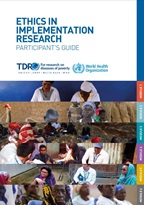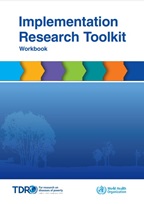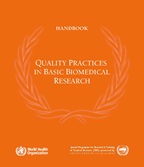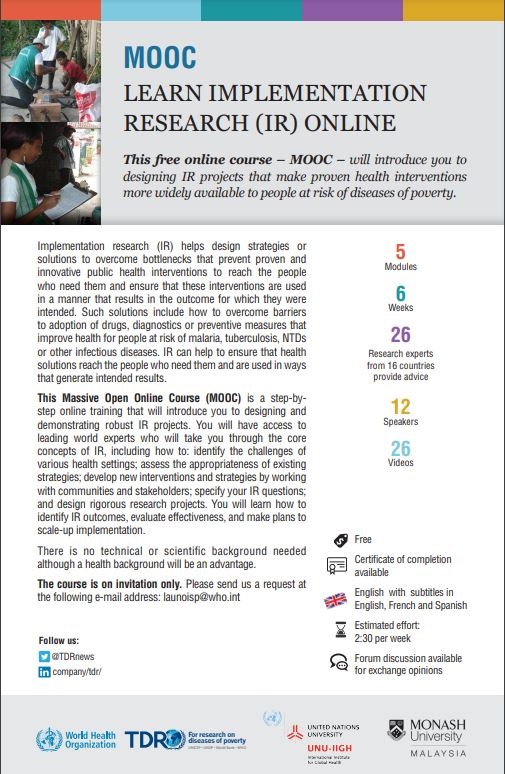
Implementation research training materials
Implementation research training materials
Implementation research (IR) is the systematic approach to understanding and addressing barriers to effective and quality implementation of health interventions, strategies and policies. It is demand-driven, with research questions framed on the basis of needs identified by relevant stakeholders/implementers working together in the health system.
TDR provides a continuum of training materials on implementation research.
Massive open online course (MOOC) on implementation research (IR): infectious diseases of poverty
With the help of invited experts from regions around the globe, this is a step-by-step online training for public health researchers and decision-makers, disease control programme managers, academics and others that focuses on how to design and demonstrate robust IR projects on infectious diseases of poverty.
The aim is to illustrate the following IR concept: how to identify the challenges of various health settings; assess the appropriateness of existing strategies; develop new interventions and strategies by working with communities and stakeholders; specify the IR questions; and design rigorous research projects. Case studies are introduced, presented and interpreted by experienced public health researchers, practitioners and academics.
Implementation research toolkit
This toolkit provides deeper learning on implementation research, helping people learn a standard process that can lead to results that can be compared across regions and countries. It is designed to help identify system bottlenecks and the stakeholders to be involved in the process, formulate appropriate research questions, conduct the research and develop a plan for implementing the study results.
The revised version of the Implementation research toolkit is now available online:
- It is divided into eight nonlinear modules.
- There are new modules on Understanding IR, Integrating IR into the health system, IR-related communications and advocacy and Intersectional gender lens.
- Modules are self-contained, so they can be used as stand-alone tools, according to the relative understanding and skills of users in each thematic area.
- The IR toolkit is now in a self-learning format, unlike the previous version that had to be used through workshop settings.
- It can be explored from start-to-finish or focus on any specific module depending on the unique needs of the individual or research team.
- Now research teams can use it individually or together, and in their own time and pace.
Training course on ethics in implementation research
TDR and WHO's Global Health Ethics team have jointly developed a training course for researchers and research ethics committees on the important ethical considerations in IR. The course comprises six interactive modules interspersed with activities including case studies, role-play and quizzes.

TDR and WHO's Global Health Ethics team have jointly developed a training course for researchers and research ethics committees on the important ethical...

TDR and WHO's Global Health Ethics team have jointly developed a training course for researchers and research ethics committees on the important ethical...
- Module 1: Introduction to IR
- Module 2: Ethical considerations in IR
- Module 3: Ethical issues in planning IR
- Module 4: Ethical issues in conducting IR
- Module 5: Ethical issues post-IR
- Module 6: In-depth ethical analysis of IR using case studies
WHO Global Health Ethics
Principles of implementation research (PIR) course
This provides an overview to implementation research. It serves as an introduction to fundamental terms, concepts, and principles of IR and their application. It explains the basic components of implementation research frameworks, as well as key constraints to implementation. Additionally, the course provides knowledge on common methods and conduct of IR, ethics and quality assurance in IR as well as skills for community engagement and stakeholder analysis. It also explores key research communication skills required for disseminating implementation research findings and scale up of intervention. This has been developed by the School of Public Health at the University of Ghana, with assistance from the network of the TDR supported regional training centres.
The course covers five modules:
- Module 1: Introduction to implementation research
- Module 2: Methods in implementation research
- Module 3: Ethics and quality assurance in implementation research
- Module 4: Community and stakeholders engagement
- Module 5: Communication, dissemination and scale-up
Guidance for publishing implementation research results
Implementation research utilises a range of different research designs, so existing reporting guidelines have only partially covered the need for guidance. TDR worked with the World Health Organization (WHO) and the Alliance for Health Policy & Systems Research (AHPSR) to develop new reporting guidelines. They are designed to improve the quality of reports on these types of research, and in due course the quality of the research itself.
Publications

Good clinical laboratory practice (GCLP)
In 2006, WHO/TDR convened a meeting of organizations engaged in clinical trials in disease endemic countries to discuss the applicability of GCLP guidelines...

This document is the revised version of the draft handbook Quality standards in basic biomedical research (TDR/PRD/QSBR/01.1), published in 2001. The draft...
Handbook : good laboratory practice (GLP)
This handbook is designed as an aid for those countries wishing to upgrade their laboratories to GLP status. Based on the Organisation for Economic Cooperation...
Training manual: good laboratory practice (GLP): trainee
This manual provides resource material for good laboratory practice (GLP) training. It is based on the Organisation for Economic Cooperation and Development...
Related news on implementation and operational research



